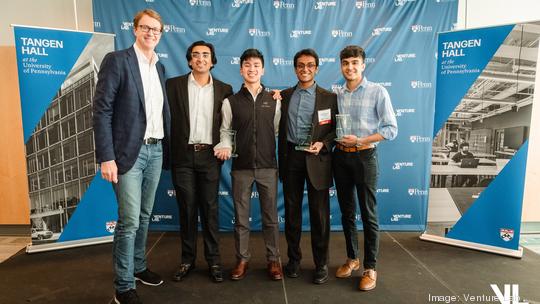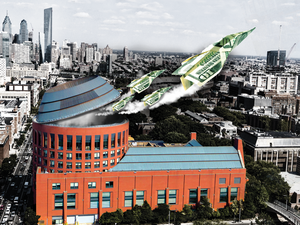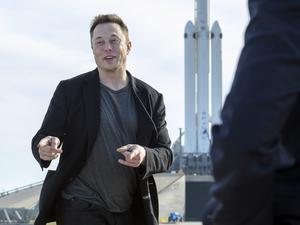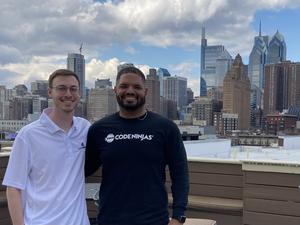
Four freshmen at the University of Pennsylvania are on a mission to make drinking water and biopharma product endotoxin testing more sustainable.
The founders of ToxiSense took home multiple prizes, including the Perlman Grand Prize, in Penn’s Venture Lab Startup Challenge last week, raking in a total of $85,000 to grow their business.
The Venture Lab Startup Challenge is now in its sixth year, and ToxiSense vied for top marks against seven other finalists. Winners were determined by a panel of Penn alumni judges.
More than just funding, the victory is a validation of the work started years ago by ToxiSense CEO and Co-founder Aravind Krishnan, who is in a dual-degree program studying molecular and cell biology plus health care management and statistics.
Growing up in Hillsborough, New Jersey, Krishnan took an 8th-grade field trip to the Shore where he and his classmates learned about the damage caused by over-harvesting horseshoe crabs, which are experiencing population declines. Part of that is a result of climate change and using the creatures for bait, but another factor is the use of horseshoe crab blood to test for bacterial toxins in things like drinking water and biopharmaceutical products. In 2016, about 430,000 horseshoe crabs were collected in the United States for biomedical purposes, according to a report from the Atlantic States Marine Fisheries Commission. While such crabs are returned to the ocean after some of their blood is collected, an estimated 15% of them perish.
“Horseshoe crabs are a keystone species in that ecosystem, which means that all animals in that environment depend upon it,” Krishnan said.
Wanting to see if a more sustainable solution was possible, Krishnan began researching alternatives. In the Rutgers University lab of Eric Lam, a professor in the plant biology department, Krishnan discovered a plant called Arabidopsis, which has an immune response to bacterial toxins. He subsequently developed a genetically engineered version.
That discovery was the basis for ToxiSense, which he launched this past year at Penn with three other freshmen – Udit Garg, Andrew Diep-Tran, and Aarush Sahni.
The engineered plant takes about three weeks to grow, Krishnan said, after which its leaves are harvested and made into a solution that will glow when toxins are detected in a sample.
Currently a bioluminescent sensor is used for those detections, which is included in the ToxiSense kit. Krishnan said as they enter the next phase of research and development they hope to amplify that response so that it can be visible to the naked eye, as well as refine its sensitivity level to toxins.
The genetically engineered plant is not only a sustainable option, but it’s much more cost-effective. The ToxiSense test costs just 50 cents, whereas its horseshoe crab derived counterpart is $19, Krishnan said.
While the big focus will be on the biopharma industry, ToxiSense will also target drinking water. That has personal significance to Krishnan, whose parents grew up in India where less than 50% of the population has access to potable water, according to UNICEF.
“Going there as a child and taking family trips there in my grandparents’ rural environment, I saw these immense problems with the lack of access to clean drinking water,” he said.
In addition to selling to consumers, ToxiSense is looking to work with municipal water departments and nonprofits like UNICEF and Charity Water for testing. “I see immense potential both domestically and abroad,” Krishnan said.
The goal is to enter the water testing market first, a move targeted for the middle of 2023. By the end of next year, the startup hopes to be working with biopharma companies to begin testing their products. It then plans to submit its test kit to the Food and Drug Administration for approval with the goal of entering the biopharma market by the end of 2024 or early 2025.
The Startup Venture grant was the largest infusion of funding ToxiSense has received since its founding, and Krishnan said the co-founders plan to funnel about $50,000 into R&D and developing prototype kits. They’ll use the award for legal fees toward obtaining two utility patents and one plant patent, with another $10,000 going to marketing and customer acquisition.
Krishnan hopes this is just the start for ToxiSense. “I think this initial technology that we built can definitely be the basis for different technologies and can usher in this new wave of biotechnology that uses natural systems to accomplish tasks that are useful to us,” he said.







